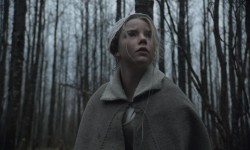Cinema | March 7th, 2016

WARNING: The following review reveals key plot information. Read only if you have seen “The Witch”
Near the thrilling, ecstatic conclusion of first-time feature director Robert Eggers’ “The Witch: A New-England Folktale,” our young protagonist Thomasin (Anya Taylor-Joy), having endured unspeakable horrors, demands that family goat Black Phillip, a possible vessel for the Devil himself, converse with her. The resulting exchange, a pulse-quickening negotiation that maneuvers Thomasin to the brink of damnation, leads to a climax of intoxicating potency, subverting audience expectations and confirming certain suspicions about what it is, exactly, that we have just witnessed.
Part psychological study, part old-fashioned campfire yarn, “The Witch” provides an imagined preamble to the events that would unfold some six decades later in Salem. There are many reasons to endorse “The Witch,” from Eggers’ finely understood sense of cinematic space to the elegant simplicity of the chronological presentation of the narrative’s increasingly unsettling events. But underneath the many competing interpretations of Eggers’ thematic agenda, one tremendously positive reading stands out above the others: “The Witch” is a powerful feminist statement.
In a recent column, Todd Van Der Werff interviewed Satanic Temple spokesperson Jex Blackmore, who noted, “There is an interest in controlling a female figure and in dictating to her what her role is in a society that benefits males.” While the must-read “Vox” post focuses primarily on A24’s bold marketing relationship with a group well outside the mainstream, Blackmore’s thoughts on patriarchal theocracy in an already intense political atmosphere provide some context for the movie’s depiction of a young woman about to be, in essence, rented out by her parents to another family as a domestic servant.
Blackmore’s written statement on “The Witch,” released to coincide with the temple’s set of public events, says in part, “While the patriarchy makes witches of only the most socially vulnerable members of society, Eggers’ film refuses to construct a victim narrative. Instead it features a declaration of feminine independence that both provokes puritanical America and inspires a tradition of spiritual transgression.” These ideas, I think, are at the heart of claims regarding the film’s potential for future classic status in intriguing pieces like the one Chris Eggertsen wrote called “Why Do So Many Horror Fans Hate ‘The Witch’?”
Starting with Thomasin but extending to members of her immediate family and the coven she will eventually join, images of womanhood in “The Witch” are stitched into an important motif that acknowledges several persistent archetypes. The succubus and the hag bookend the external representation of the spellbinder who operates outside of the rules and expectations of the governed community. Thomasin herself, passing through the liminal state between childhood and post-adolescent maturity, stands at the center of a precarious place – whether that be 1630s North America or today.
The last sections of “The Witch” bring to full fruition any number of Eggers’ promises. Has Thomasin been groomed for her moment with Black Phillip since the family’s arrival at their forest-edged homestead? Is she responsible for brother Samuel’s disappearance? Typically, young women accused of witchcraft by others, including their own family members, are only guilty of threatening masculine authority.
Eggers can be commended for his handling of Thomasin’s emerging sexuality as recognized most viscerally by brother Caleb, but the reactions of mother Katherine and father William are equally stirring. No matter what Thomasin has done or not done, her answer is the same we would give when asked by Black Phillip, “Wouldst thou like to live deliciously?”
February 16th 2026
February 16th 2026
February 9th 2026
February 4th 2026
January 26th 2026


__293px-wide.png)
__293px-wide.jpg)
_(1)_(1)_(1)_(1)_(1)__293px-wide.jpg)
